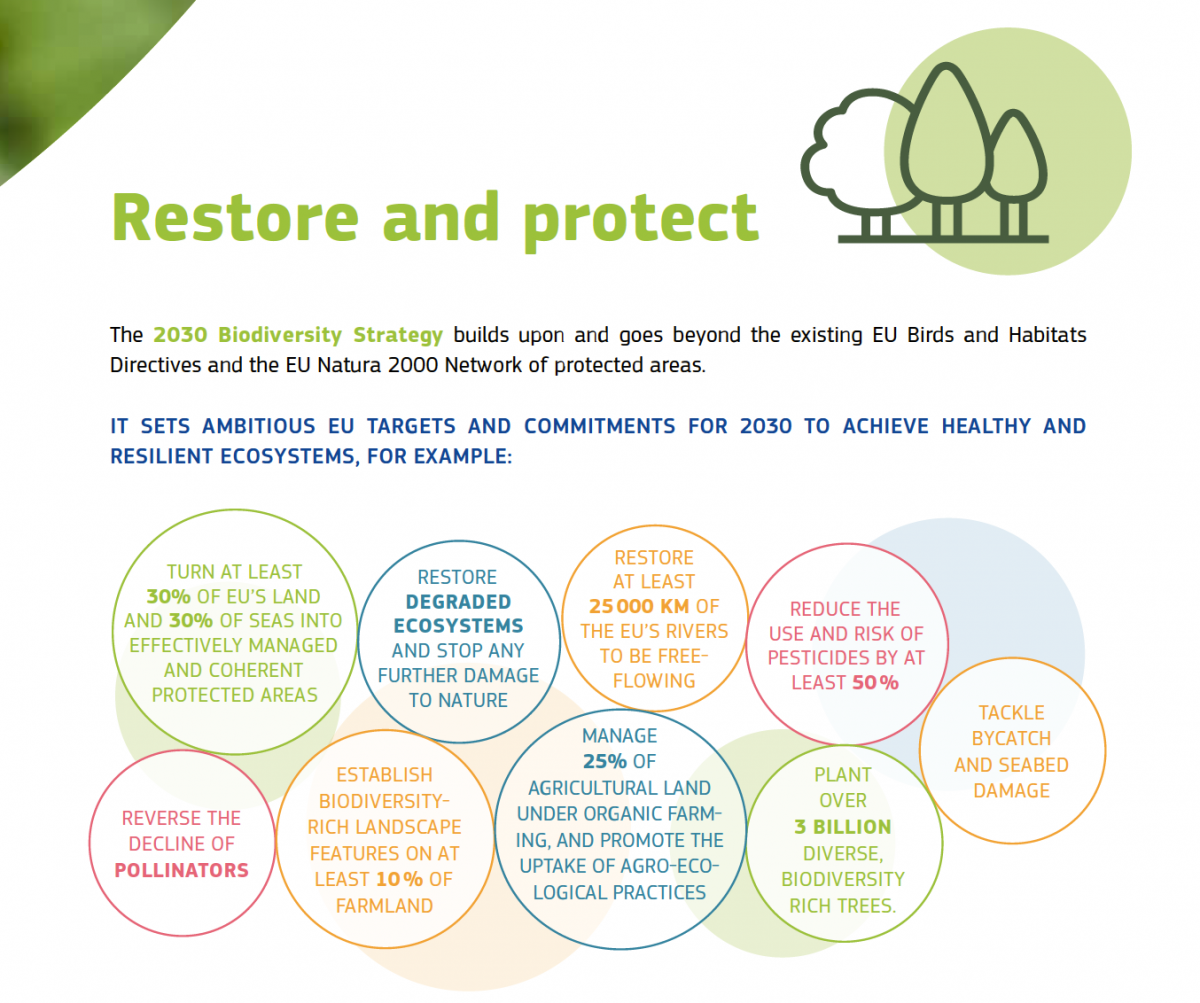
This new Biodiversity Strategy builds on what has worked in the past, and adds new tools that will set us on a path to true sustainability, with benefits for all. The EU's aim is to protect and restore nature, to contribute to economic recovery from the current crisis, and to lead the way for an ambitious global framework to protect biodiversity around the planet.
- Virginijus Sinkevičius, EU Commissioner for the Environment, Oceans and Fisheries
The European Green Deal, presented by the von der Leyen Commission on 11 December 2019, sets an ambitious roadmap towards a climate-neutral circular economy, where economic growth is decoupled from resource use. In line with it, on 20th May the European Commission adopted a new Biodiversity Strategy aiming at tackling the five main drivers of biodiversity loss, such as unsustainable use of land and sea, overexploitation of natural resources, pollution, climate change and invasive alien species.
In the last four decades, global wildlife populations fell by 60% as a result of human activities and almost three quarters of the Earth’s surface have been altered. Interlinks between biodiversity and climate change cannot also be neglected. Protecting and restoring wetlands, peatlands and coastal ecosystems, or sustainably managing marine areas, forests, grasslands and agricultural soils, will be essential for emission reduction and climate adaptation. Adopted in the heart of the COVID-19 pandemic, the strategy is a central element of the EU's recovery plan, crucial to preventing and building resilience to future outbreaks and providing immediate business and investment opportunities for restoring the EU's economy.
This new strategy proposes to establish binding targets for EU countries to restore damaged ecosystems and rivers, improve the health of protected habitats and species, bring back pollinators to agricultural land, reduce pollution, green our cities, enhance organic farming and other biodiversity-friendly farming practices, and improve the health of European forests. In this regard, the Commission will propose a dedicated Forest Strategy in 2021 in line with the EU wider biodiversity and climate neutrality ambitions and further develop the Forest Information System for Europe. Next year, the Commission will also propose a new action plan to conserve fisheries resources and protect marine ecosystems where measures to limit the use of fishing gear most harmful to biodiversity, including on the seabed will be introduced. The EU will also put greater efforts to restore freshwater ecosystems and the natural functions of rivers, in line with the EU Water Framework Directive. In terms of pollution, the commission will promote the reduction of use of fertilisers by at least 20% and put forward a new initiative in 2021 on sustainable corporate governance, to ensure environmental and social interests are fully embedded into business strategies. Finally, a new Knowledge Centre for Biodiversity will be established in 2020 in close cooperation with the European Environment Agency.
To meet the needs of this strategy, at least EUR 20 billion a year will be unlocked for biodiversity through various sources, including EU funds, national and private funding. In 2021, the Commission will adopt a delegated act under the Taxonomy Regulation to establish a common classification of economic activities that substantially contribute to protecting and restoring biodiversity and ecosystems. This will be further supported by a Renewed Sustainable Finance Strategy later this year which will help ensuring that the financial system contributes to mitigating existing and future risks to biodiversity and better reflect how biodiversity loss affects companies’ profitability and long-term prospects.
 Biodiversity is also a priority of the EU’s external action and an integral part of efforts to meet theUnited Nations Sustainable Development Goals.
Biodiversity is also a priority of the EU’s external action and an integral part of efforts to meet theUnited Nations Sustainable Development Goals.
The strategy reaffirms the EU's determination to lead by example in tackling the global biodiversity crisis, ensuring that EU actions do not result in deforestation in other regions of the world. In this spirit, the EU is ready to lead all efforts to agree an ambitious new global framework for post-2020 at the upcoming 15th COP to the Convention on Biological Diversity in Kunming. In particular, the Commission will propose to that this will include, at a minimum, the following elements:
- Ensure that by 2050 all of the world’s ecosystems are restored, resilient, and adequately protected;
- A much stronger implementation, monitoring and review process through revisions of the National Biodiversity Strategies and Action Plans by the end of 2021; and
- A principle of equality, ensuring the full and effective participation of indigenous peoples and local communities.
In line with the International Ocean Governance agenda, the EU will support the conclusion of an ambitious legally binding agreement on marine biological diversity of areas beyond national jurisdiction (BBNJ) by the end of 2020 and continue engaging with Small Island Developing States to participate in meetings of regional and global organisations. In particular, the Commission encourages relevant Member States to set-up ecologic corridors in Overseas Countries and Territories, which host important biodiversity hotspots.
Trade policy will also actively support and be part of the ecological transition. In this regard, the Commission will present in 2021 a legislative proposal to avoid or minimise the placing of products associated with deforestation or forest degradation on the EU market, and to promote forest-friendly imports and value chains. The Commission will also revise the EU Action Plan against Wildlife Trafficking in 2021 and propose a further tightening of the rules on EU ivory trade later this year.
Finally, the Commission will increase its support to the Intergovernmental science-policy Platform on Biodiversity and Ecosystem Services/IPBES (to which countries such as India, China, Malaysia, Japan, Republic of Korea, Australia and New Zealand are already among the donors) and the Global Biodiversity Coalition launched in March 2020 to help raise awareness around the world on the need to protect and nurture biodiversity.
More information at EU Environment



